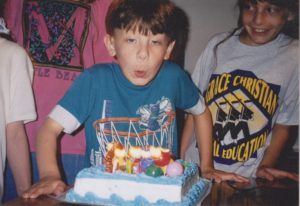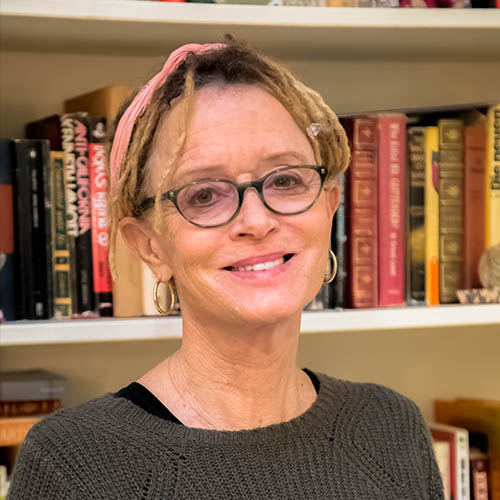 Joshua and his three sisters on his 7th birthday. Sarah Beth is in the Myrtle Beach shirt.
Joshua and his three sisters on his 7th birthday. Sarah Beth is in the Myrtle Beach shirt.
Years ago, when I was taking an undergraduate fiction writing class, the professor talked about the short fiction he wrote in the year after his mother’s death. He showed his work to a friend, and the friend told him, “I see your mother on every page.” My professor protested angrily, but he went home and realized it was true. He was writing fiction, not autobiographical, not about dead mothers, but deep down, he was writing about his personal loss.
I found something similar happening to me when I was writing “Beagle in the Road,” five years after my brother’s suicide. I was writing about a moment when I was thirteen years old, seventeen years before I lost my brother. At that point, Joshua was five and happy, likely playing with Hot Wheels cars or shooting outlaws in a computer game that came free in a box of cereal. My little brother had nothing to do with my decision to follow my beagle into a busy road, so he didn’t belong in the essay. Still, I found myself embedding my grief into every line, and unlike my professor, I was intensely aware that this was happening, surely because I was (and still am) in the midst of writing a memoir about Joshua. I knew I wouldn’t have written the piece at all if he hadn’t died. After a few years of witnessing my parents’ grief, the beagle memory came back to me, and I suddenly felt horror mixed with my old pride and gratefulness about the risk I’d taken that day.
When I came to the end of the essay, I struggled with how to close without my brother. Throughout the piece, I’d felt his five-year-old shadow running alongside my thirteen-year-old self, both of us buoyant in our innocence of everything that would come later. And in the end, I pictured my brother’s twenty-two-year-old body when I imagined myself dead on the road. So, I tried to shoehorn his suicide into the turn, explaining to readers why I saw this moment so differently years later, after I’d witnessed the broken health and malaise that can follow the loss of a child. But the suicide revelation kept feeling melodramatic, a disrespect to my lost brother and to my parents’ grief. Since Joshua wasn’t present on the essay’s surface, I hadn’t developed him as a character, and readers couldn’t mourn a brother they didn’t know. I finally realized I had to stay in the moment, focusing on the relationships between characters who were actually present: my beagle and me, my dad and my beagle, my dad and me. The audience would understand that my life and perspective had changed in the time since I rescued my beagle. The reason I had changed was beside the point.
Of course, I have my own personal readers like my professor’s friend, people who saw my brother on every page. My most important reader, my writer sister, got it immediately. A poet friend read the essay, expecting a piece about my childhood beagle, and she said, “Wow, this fits right into your memoir!” And it does fit. Eventually, when readers see the piece in context, they’ll know it’s about Joshua. When I describe my dad’s potential grief, they’ll think of that horrible day seventeen years later. They may even cringe as I do over that imagined image of my broken body, thinking of my brother’s body hanging in his closet. But I also know that context also isn’t necessary. Readers who didn’t know my professor couldn’t get the mother connection in his stories, but I’m sure they felt moved by the undercurrents of grief—likely something that’s often happening to me when I find myself moved by a story, essay, or poem in an unexpected way.
In the end, I couldn’t help myself. I was burning to mention Joshua, so I put him in my bio. In creative nonfiction, the biographical note inevitably changes readers’ perception of the essay, so I decided to take advantage of that. But let’s face it: not everyone reads bios. If everyone did, my own undergraduate students would never call female writers “he.” And I know that one-sentence mention of my brother isn’t nearly enough to allow the most careful readers to understand all of the Joshua resonances that exist for people who know me. So, for readers who don’t see this blog post, or connect the piece to my other work, I’ll be content to let that grief stay concealed within my body—my real body, my live body in the essay, my imagined smashed body in the essay—the place where grief always hides.


 Today we are pleased to feature author Kaylee Sue Duff as our Authors Talk series contributor. In the podcast, Kaylee discusses the creative process behind two of her flash fiction pieces, “Nothing” and “The Deer,” and the intertwined nature of the stories themselves.
Today we are pleased to feature author Kaylee Sue Duff as our Authors Talk series contributor. In the podcast, Kaylee discusses the creative process behind two of her flash fiction pieces, “Nothing” and “The Deer,” and the intertwined nature of the stories themselves. Joshua and his three sisters on his 7th birthday. Sarah Beth is in the Myrtle Beach shirt.
Joshua and his three sisters on his 7th birthday. Sarah Beth is in the Myrtle Beach shirt. “An old lady poem,” was the judgment of a friend recently. I was offended, then considered—at 73, am I getting to be an old lady? How could that happen!
“An old lady poem,” was the judgment of a friend recently. I was offended, then considered—at 73, am I getting to be an old lady? How could that happen!